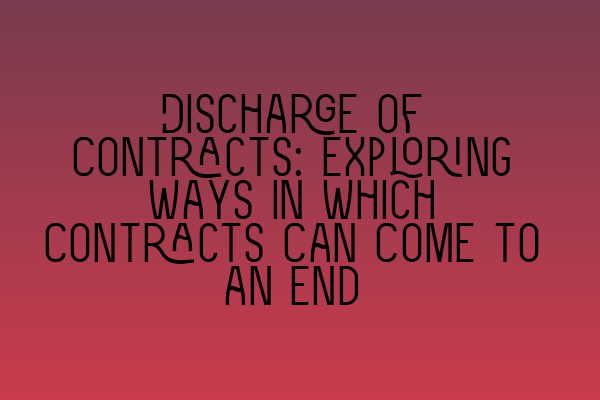Discharge of Contracts: Exploring Ways in Which Contracts Can Come to an End
Contracts play a crucial role in the business world, serving as legal agreements that bind parties together. However, just as contracts are created, they can also be discharged, meaning they come to an end. Understanding the various ways in which contracts can be discharged is essential for anyone involved in commercial transactions. In this blog post, we will explore the different ways in which contracts can be discharged.
1. Performance:
Performance refers to the completion of all contractual obligations by the parties involved. When both parties fulfill their contractual duties according to the terms specified, the contract is considered fully performed. This is the most straightforward way for a contract to be discharged. However, partial performance may also be accepted if both parties agree to it.
2. Agreement:
An agreement between the parties involved can lead to the discharge of a contract. This agreement may occur before or after the contract is formed. In some cases, the parties may mutually agree to terminate the contract, known as mutual rescission. Alternatively, they may agree to modify the terms of the contract, leading to the creation of a new agreement that replaces the old one.
3. Frustration:
A contract may be discharged due to frustration if an unforeseen event occurs that makes it impossible to fulfill the contract’s obligations. This event must be beyond the control of the parties and not due to their fault or negligence. Frustration can occur in situations such as natural disasters, war, or the death or incapacity of a party. When frustration occurs, the contract is automatically brought to an end.
4. Breach:
A contract may be discharged if one of the parties fails to fulfill their obligations without a valid reason. This is known as a breach of contract. A breach can be a material breach, where the party fails to perform a vital contract term, or an anticipatory breach, where one party indicates an unwillingness or inability to perform the contract in the future.
5. Operation of Law:
In certain circumstances, the law itself may intervene to discharge a contract. This can occur when:
– Illegality: If a contract becomes illegal after it is formed, it is automatically discharged.
– Bankruptcy: If one of the parties becomes bankrupt, the contract may be discharged.
– Limitation: If the contract is subject to a statute of limitations, it may be discharged if the specified time period expires.
It’s important to note that some contracts may contain specific clauses addressing the discharge of the agreement. These clauses can provide additional grounds for discharge or specify the procedures to be followed in the event of discharge.
Understanding the different ways in which contracts can be discharged is essential for protecting your legal rights and obligations. Whether you are a business owner, a professional, or an individual entering into a contract, being aware of these discharge mechanisms can help you navigate potential conflicts and ensure a smooth and fair resolution.
If you are planning to take the SRA SQE exams, it’s important to have a solid understanding of contract law. To enhance your preparation, you can test your knowledge with SQE 1 practice exam questions and practice mocks FLK1 and FLK2. Additionally, SQE 1 and SQE 2 preparation courses are available to help you ace the exams. Make sure to check the SRA SQE exam dates to stay up-to-date with the latest information.
In conclusion, contracts can come to an end through various means, including performance, agreement, frustration, breach, and operation of law. By being well-informed about these discharge mechanisms, you can protect your legal interests and navigate contractual obligations effectively.
Sources:
– SQE 1 Practice Exam Questions
– SQE 1 Practice Mocks FLK1 FLK2
– SQE 2 Preparation Courses
– SQE 1 Preparation Courses
– SRA SQE Exam Dates
